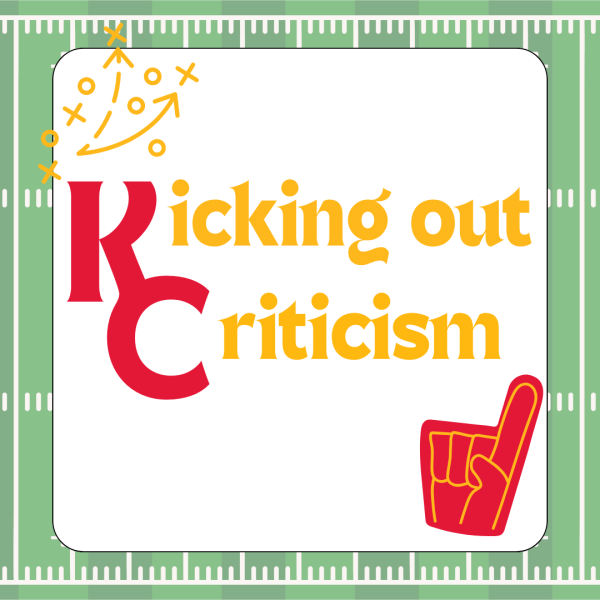Society needs to stop buying into diet culture
According to Boston Medical Center, an estimated 45 million Americans are currently on some type of diet, whether that be Atkins, keto, paleo, Nutrisystem or any one of the myriad fad diets currently worshipped by our society. The harmful ideals of diet culture have embedded themselves in the daily lives of people around the world, and have created distorted views of food and body image that must be repaired.
As anti-diet registered dietician Christy Harrison said on her blog, diet culture can be defined as a system of beliefs that “worships thinness” and “demonizes certain ways of eating while elevating others,” which is harmful to those who don’t meet the criteria of what diet culture ideology deems healthy.
Counselor Kelli Baucom said diet culture is something she actively has to fight to ignore in her daily life in order to keep its negative impact at bay.
“For me, diet culture has always been this constant message out there through TV, print ads, print media that everyone should always be on a diet,” Baucom said. “There’s always — on every magazine, it seems like — there’s some sort of reference to a diet that you could try or a workout plan or some way and it just creates this environment where everyone feels that something must be wrong.”
The frequency of the discussion of diets, what people should or should not be eating and what can be done to lose weight is how diet culture presents itself to the public. Once these ideas are spread, they embed themselves in the minds of consumers, until it becomes a dangerous, harmful way of viewing food, exercise and personal health. Senior Briana Lowe said she’s seen the effects of diet culture among friends and family, and the pressure it puts on individuals to look their best is constant.
“When I think of dieting, I oftentimes think of failure, honestly, because diets just put this expectation of perfection and you can’t have a cheap meal, you can’t skip a day of working out, everything has to be perfect and has to be scheduled out, but it’s really unrealistic,” Lowe said.
According to the US Department of Health and Human Services, nearly half of first-third grade American children actively want to be thinner, while half of 9-10 year old girls are dieting. Baucom said her own issues with body image began in fourth grade.
“I think it can start really young, and I think it goes all the way into adulthood at times,” Baucom said. “It seems to come after more girls and women than young men, but we do talk to young men all the time who also struggle with what they’re supposed to be according to all the men’s health magazines, that have the same kinds of articles.”
While the rate of young children who are concerned about their weight and what they’re eating is rising, there is an alarming amount of young adult women who are constantly trying to lose weight through dieting. According to the National Association of Eating Disorders, 91 percent of women surveyed on a college campus reported trying to lose weight through dieting. Senior Georgia Raaf said teenagers and young adults are most impacted by diet culture.
“I definitely think it’s young people from age 15 to like 25, because at that age you’re doing new things, you’re meeting new people, you’re in high school, you’re in college,” Raaf said. “You have this image that you have to fill and portray online … especially with social media now. It’s like, ‘Who can get the most likes?’ and obviously people are attracted to that sort of thing, like abs and all the fitness people online. That’s how people get famous now, but they probably didn’t get there by doing super strict diets whereas people think you have to.”
In many ways, diet culture has turned food into an enemy. Diet culture forces society to question everything they eat and consider the consequences a certain type of food will have on their bodies. This type of mindset instills fear and shame in individuals every time they sit down to eat a meal, which is something that should be enjoyable. Raaf said the ideas diet culture has about food are always in the back of her mind, making her question herself and her food choices.
“Food is definitely categorized into ‘good’ and ‘bad,’ or ‘healthy’ and ‘unhealthy’ rather than just, ‘I’m going to eat this burger because it sounds good,’” Raaf said. “I think a lot of us have gotten away from intuitive eating and listening to your body and what food is going to fuel your body, and it’s more of, ‘How little can I eat in one day?’”
According to the National Eating Disorder Association, intuitive eating is “trusting your inner body wisdom to make choices around food that feel good in your body, without judgment and without influence from diet culture.” Intuitive eating is a new, healthy way of viewing food in order to undo the diet culture ideologies that demonize food. Baucom said food needs to be viewed as fuel rather than something that can be manipulated to
lose or gain weight. “Your body needs to be fueled to do the things that you you want to do. Sometimes, you need to eat in a more specific way,” Baucom said. “If you’re an athlete, you have a different requirement for calories and the foods you need to eat, versus if you’re just an average everyday office worker type of person. Viewing food as fuel, as opposed to separating things into categories of good foods and bad foods. You wouldn’t expect your car to go with no gas. You can’t do that with your body either.”
Another staple of diet culture is calorie counting. Calorie counting is the obsession with how many calories are in food, how many calories someone can eat in a day without gaining weight, and how few calories someone can eat while still being able to function. According to registered dietician Alexandra Reed on “Ask a Dietician: Why You Should 100% Stop Counting Calories,” calories have been “grossly distorted” by diet culture and instead of focusing on calories, it’s important to ask where calories are coming from.
At the end of the day, calorie counting is a method people use to try to eat less so they can lose weight. The fewer calories an individual eats, the more weight they will lose. Therefore, counting calories can play a large role in the development of disordered eating as it advocates for intense control of food born out of fear. Baucom said eating disorders and body image issues are seen commonly at school, usually stemming from other, larger issues.
“People make food choices based off of what they think is going to allow them to lose the most weight,” Baucom said. “They’re looking at the lowest calorie option, versus what’s going to sustain them longer; again, what’s going to allow them to do the activities that you want to do.”
As the main purpose of diets is often to get people to eat less so they can lose weight, it’s no wonder these diets are often extremely restrictive to a point that is dangerous. Lowe said those who don’t eat enough put their energy levels, and therefore their learning, at risk.
“I think that restrictive diets impact learning, especially if you’re not getting enough protein,” Lowe said. “You’re not going to be as attentive as you would be if you were getting the right vitamins and nutrients that you need to stay awake and stay alert during the school day — especially kids who don’t eat breakfast, because they don’t want to eat as much food because they’re trying to lose weight.”
Not only are restrictive diets harmful to your energy level, but to your ability to pay attention. A common symptom of a restrictive eating disorder is the inability to concentrate, which can cause major problems when it comes to learning in school. According to Center for Change, an institution which helps those with eating disorders, academics and extracurriculars are “almost completely curtailed in the advanced stages of an eating disorder and will lead to massive disruption in a student’s educational advancement” until the problem is addressed. Baucom is aware of this issue, as she said learning when you are starving is extremely difficult.
“Your brain does not know that you are making a choice not to feed it, as opposed to that there is some sort of famine or you are on the run from some sort of creature that is trying to get you,” Baucom said. “It will end up conserving calories at a point, so you don’t lose the weight that you think you’re going to lose, which then usually gets people to drop to an even lower calorie count. Your body needs a certain number of calories to run its basic functions. Its basic operating system requires a certain number of calories every day, and when you go below that it slows systems down. It slows your heart rate down, you can’t think. You’re so hungry that you can’t access the part of your brain that helped you study for that chemistry test the night before.”
The effects a poor or extremely limited diet can have on performance in academics is only one of many complications. When an individual’s mind is consumed with thoughts about food and losing weight as a result of diet culture ideologies, it becomes nearly impossible to live out a normal life separate from that. According to Psychology Today, teenagers with extremely restrictive diets hold decreased trust in others, “show an unwillingness to disclose personal information to others, notably about eating” and “show elevated loneliness.”
While many people diet without falling into the category of having an eating disorder, the fear that diet culture can instill in an individual when it comes to certain foods or merely when it comes to eating in general can lead to disordered eating. There’s a fine line between trying to eat a healthy diet in order to maintain a healthy life, and falling prey to obsessive behaviors that are problematic long-term. Baucom said the choices made that isolate an individual who is dieting can turn out to be dangerous.
“If everybody was going out for ice cream, you might choose not to,” Baucom said. “Then you kind of end up isolating yourself socially, which all just kind of can play into, especially, an eating disorder. That can really fuel that fire of feeling not good enough and that these are things that you can’t do and should not do because you’re trying to lose weight.”
According to a report on statista.com, reviewing the percentage of high school students trying to lose weight in 2017, an average of 59.8 percent of females compared to an average of 34.8 percent of males were actively trying to change their weight. That’s a 25 percent difference between males and females. While it’s important to note that men do struggle with societal expectations of how their bodies should look, the statistics consistently show that women are more susceptible to diet culture ideologies about body image. Baucom said the issues of body image and dieting are
most frequently seen among female students.
“In the case of girls and women, I think that that constant feeling of not good enough, that dieting and the bombardment of the media aspects around diet and exercise can contribute to a lot of women not feeling good enough,” Baucom said. “We lose out when women don’t feel good enough and don’t want to be involved or don’t push themselves out of their comfort zones — to be involved in positions of power, to do more things, to share their opinions, to do these things — because they can get caught in this belief of not being good enough and food definitely plays a role in that.”
The image of the ideal body and what can be done to get that ideal body is stubbornly woven into everyday life. For example, you’ll rarely pick up a magazine without seeing something about a new diet you can try or how to get six-pack abs in as little as a few weeks. Raaf said the images of six-pack abs and new celebrity diets are harmful and ever present.
“I think it’s definitely hurt our society more than it’s helped it, because now you can’t just watch TV without seeing advertisements for The 30 Day Fix or even Seven Day Fix which is like—a week? That’s completely unreasonable,” Raaf said. “It’s definitely built its own industry based off of people’s insecurities and desire to be fit and fit the stereotypical, healthy version of yourself.”
The idea that an entire industry has been created around dieting and weight loss is undoubtedly true. According to TIME magazine, the weight loss industry — an industry focused on making money by targeting individual’s insecurities — is worth $66.3 billion. Lowe said the idea of losing weight seems to be in everybody’s mind whenever they eat, leaving a negative impact.
“I think that weight loss, diets and different methods of losing weight are so prominent in the media right now, that everybody thinks they need to be losing weight even if they don’t,” Lowe said. “I definitely think that food has a big impact in that.”
It doesn’t help that many people are not educated on nutrition outside of what they see in the media about dieting and perhaps a semester-long class in high school. This lack of education can be extremely harmful to young children. Baucom said when she was in elementary school, her lack of knowledge about weight caused poor body image.
“My first real concrete memory of that is being a fourth-grader, and when I was in elementary school, they used to line us up once or twice a year and they would weigh everybody and they would take everybody’s height, and by the time I was in fourth grade I was quite tall for my age,” Baucom said. “I was almost five feet tall. I didn’t understand the relationship between height and weight, so I always felt big. When I would see my classmates, who were quite a bit shorter than me, but also weighed less than I did, it really messed with my head.”
This lack of education can not only lead to a warped perception of what a healthy weight looks like for each person, but, in terms of dieting, it has led society to believe that there are certain miracle diets that will work for everyone. Yet, everyone’s body is different, and everyone’s activity level is different, so this misconception is dangerous. Raaf said while many believe there is one right way to diet, there is no correct way.
“Someone that works out for three hours a day is going to need a different diet than someone who sits on their butt all day long and does nothing,” Raaf said. “The athletes obviously need more proteins and carbohydrates and stuff. Other people may need something different. I think, personally, it’s all about finding the food that works for your body instead of trying to adapt this diet that someone else has on social media that makes them work a certain way, because that might work with their genes and their body, but it’s not going to work for you.”
When determining what diet is right for an individual, it is vital that outside help is obtained. While a diet can ‘work’ — meaning the desired effect occurs, whatever that may be — for a certain period of time, it’s more than likely that the effects will not last. According to The Council on Size and Weight Discrimination, 95 percent of diets fail. Baucom said when finding a diet that is right for you, speaking with a professional is the first step.
“Doctors have varying degrees of knowledge about nutrition, so also involving a nutritionist in that decision can be a great idea,” Baucom said. “If a doctor advises you for medical reasons that you need to lose weight, then that’s something that you need to seriously consider, but involving a nutritionist or a dietician — someone with a nutrition background — to help make sure you’re getting all of what you need, that is super important.”
Diet culture has taught us that we need to lose weight, and we need to lose weight no matter what. It has taught us that food is the enemy, and we are champions if we are able to resist the last few bites of cake at a party. It is possible to unlearn these ideas. We can change our view of food from something that must be fought to something that is a delicious and fulfilling tool for survival. It begins with reteaching ourselves and the generations to come. Proper and extensive education about nutrition and exercise is the greatest and most essential step that can be taken to undo the damage diet culture has done. Baucom said education on where food comes from is important for unlearning diet culture.
“I think we’ve really separated ourselves from that aspect of things: knowing where your food comes from, knowing about what protein and carbohydrates and fats and what their functions are in the body and what they allow you to do, and what happens when you don’t have those things,” Baucom said. “Teaching nutrition from more than just a food guide pyramid or My Plate type perspective, but more from what does it truly do and what are the effects of not taking your personal nutrition seriously.”












